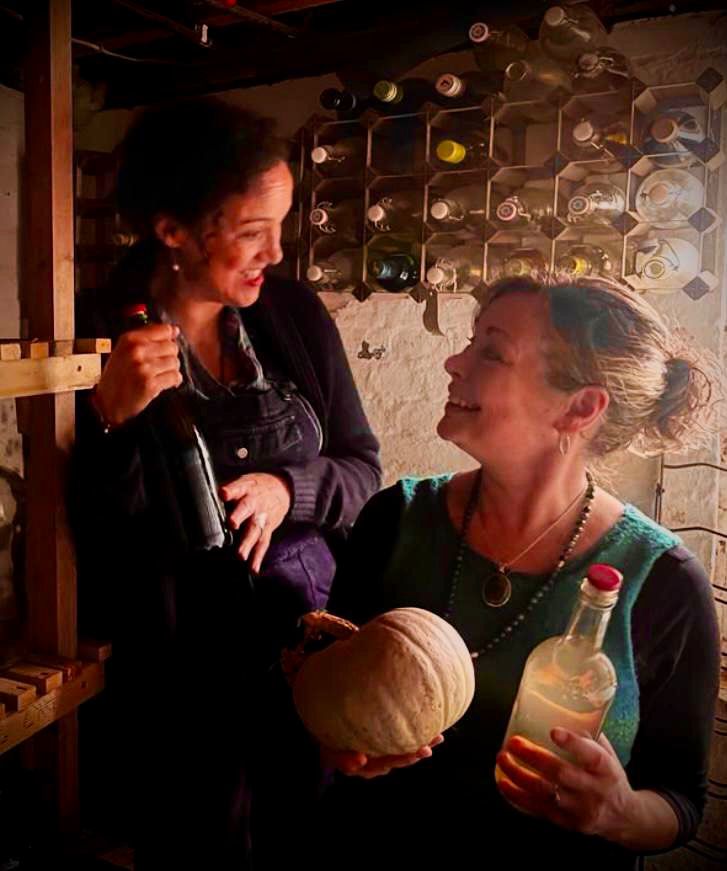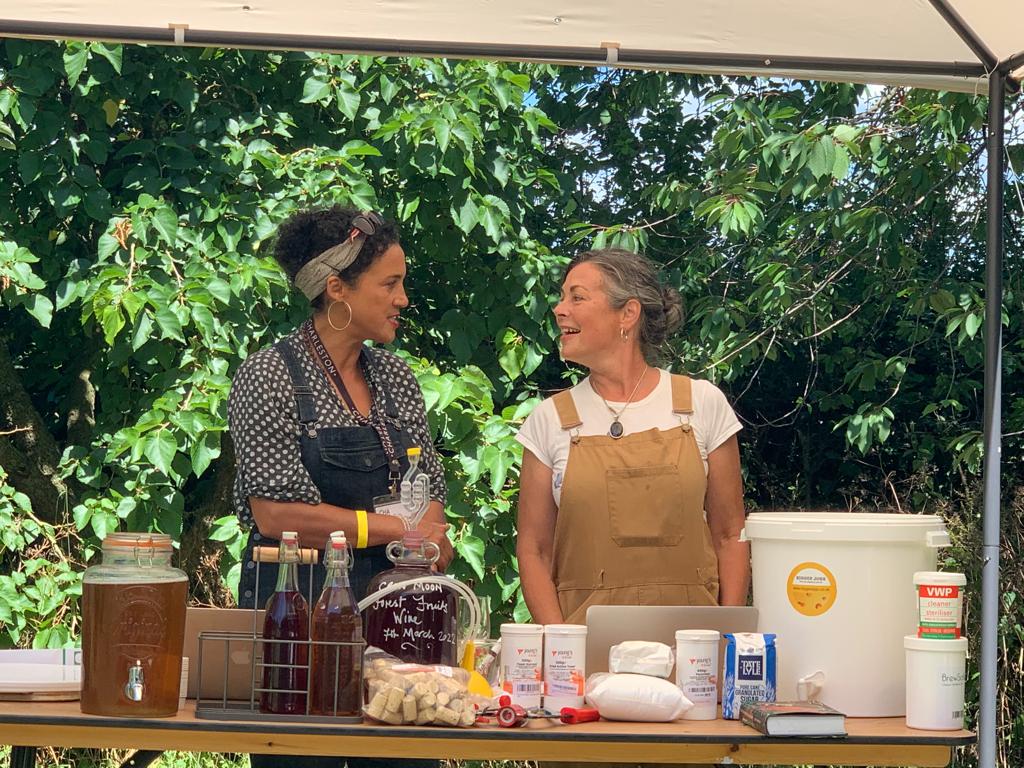Friday 15th July. 2.15pm
For the Festival of the Garden at Charleston Trust, the Resilient Life team discussed the benefits of nature’s living larder and outlined creative ways to balance our lives in harmony with the seasons. We gave a demonstration on Wild Wine fermenting, from start to finish, and how to use foraged ingredients resourcefully. There was also an opportunity for guests to sample a little of our home-made wine at the end of the workshop.
Tan:
” Resilient living is about living a more practical and considered way of life and making our own wild wine embodies the philosophy and practicality of a more resilient modern way of life. We are founders of the Resilient Life team. Resilient Living came from lockdown where we both of us, like many, faced financial challenges, but found the abundance of time was also a gift to nurture a more self-sufficient and economical way of living (where needs must etc), collating skills that were broadly based on a more mindful approach to the everyday – an approach that seemed essential to our existence, wellbeing, and security. For instance, like many of us we both share the importance of no wastage, recycling, and up-cycling, respecting the cycles of nature and the seasons, but more importantly it became apparent to us that resilience is in the mundane, every-day routines, through a daily sense of ritual and meditation, i.e., mindfully preparing food, doing the washing up, cleaning, dressing, walking, driving etc. Taking time to be in the moment and stay present including more artistic creative practices such as painting, writing, and making of which also nurture a more conscious state of mind.
So, if being resilient means how to apply a more resourceful and creative attitude to living what could be a more fitting example than Charleston, a place that was founded, and nurtured on mindful and creative resourcefulness – the ultimate resilient life.
Over lock-lock down both of us encouraged each other to forage and fetch all the gifts from the hedgerows, fields, and woodlands as well as our own cottage gardens. to create ferments and brews including kombucha, vinegars and country wines. Wine being a very necessary celebration of resilient living…Many of us enjoy a glass of wine at the end of the day to accompany or share with food, friends, or family. However, it is drunk. It’s a perfect libation that encompasses both the offerings of nature and our own creativity.
“Wine is like people. The wine takes all the influences in life all around it, it absorbs them, and it gets its personality.”
Luc (Kevin Kline), French Kiss (1995)
and if you can make your own (and I don’t mean from a kit) then the synergy between nature and process is an exceptional one. Not to mention that it’s great fun, cheap, organic and often medicinal – you won’t get a hangover
There will be an opportunity for questions and to taste a little young wine at the end, and for people to leave email addresses if they would like us to contact them about future workshops.
Historically Homemade wine has been given a very bad name, in The Good Life, Tom and Barbara’s infamous Peapod wine got Margot and Jerry very decidedly sozzled. Then there was the jail wine in Ronnie Barkers Porridge made from potato peelings. Also, the awful wine-kits that we made as students which were dire to say the least.
However, when you find yourself sipping a glass of your first hedgerow wine, from foraged fruit that you’ve collected yourself or a bottle made with ingredients from your own veg patch or fruit trees it can be a truly joyous experience and without the cost of importation to your pocket. In-fact we worked out that wild wine costs approximately 16p per bottle. Therefore, a vital mainstay of the self-sufficient homestead”.
Vicky:
“The right circumstances sometimes happen of their own accord, slyly, without fanfare, without warning. Layman’s alchemy. . . The magic of everyday things.” A quote by Joanne Harris from her novel Blackberry Wine
To make wine from everyday things you become the magician, the mad scientist and finally the one who is transformed by this most simple and delightful of alchemies.
To make wild wine you don’t need to own a vineyard or even a garden, nor do you need to plant or tend anything. The growing is all done for you at exactly the right time, biodynamically, aided not by us mere mortals but by the life force of Mother Nature.
Wild and weedy things are often the choicest ingredients for wild wines and they grow everywhere. They grow in the hedgerows and on wasted land and they are rampant and rude…they sting and they scratch, so we’ve learned to see them as a nuisance, rather than as the fundamentals for the transformative alchemy of fermentation which turns these ingredients into wine.
Wherever you live, in town or countryside, there is an acre of land around you from which you can harvest the ingredients for your own cellar of wild wines. All that we must do is to slow down and observe, to begin to know the land around us intimately, to befriend the waving, nodding plant world that we share our lives with.
We can look at the first creamy blossom of spring – the blackthorn – and we’ll know that it will be a good autumn for gathering sloes.
Clumps of nettles and dandelions then appear in the wild vineyard from which you can make your first white wines of the year. At the end of April Nature puts on a fresh robe of iridescent green and the magnificent oak trees are cloaked in a bright froth of new leaves. Harvest a few of these to make a delicious (and sometimes sparkling) white wine whose flavour is enhanced by the richness of tannins in the leaves. Be sure to save a bottle to drink on the summer solstice of the following year.
The mayflowers of the hawthorn, blackberry flowers, elderflowers, apple blossom and dog roses beautifully draw our attention to where we will harvest hedgerow fruits in the autumn for our hedgerow wines.
Year after year the wild vineyard will change. Some years are mast years where there will be a glut of one type of fruit or another, and other years there will be a dearth, so each year our wines will be unique according to the natural conditions of that time.
When the September sun is golden and warm the hedgerow fruits will be sweet. The careful act of picking the berries is like a meditation under big skies with the sun on your back and a breath of wind upon your skin.
Back in the kitchen the alchemy begins and of all the alchemies on the resilient homestead, wine making is perhaps the most magical. All you need is fruit, leaves or even roots, (such as beetroot or carrots which both make good wines), sugar, water and yeast. The sugar feeds the yeast during the fermentation process and produces alcohol and so the transformation of flavours and properties begins. Within a couple of days your wine is born, noisy and burping like a baby. You tend to it to begin with, like any new parent, stirring the bubbling brew every day for a week, and then it is sent off in its uniform demi-johns to ferment until all this bubbling and burping has stopped and the sugar has turned to alcohol. From this point onwards the wine is racked and bottled and left to mature until you want to drink it.
Drinking wine made from the land near where you live is rather different from drinking a bottle of wine from the supermarket. There isn’t the uniformity that you’d rely upon from a branded grape wine, of course. Every bottle of wild wine has its own personality and it’s great fun to try them with friends. The most surprising ingredients make for very pleasant drinking. Apples make a delicious crisp white wine which will be ready to drink by Christmas if you can get a good supply of them in the autumn. Sloes have properties that are very similar to grapes and they make a wonderful garnet red wine which takes a year or more to mature because of the high tannins in the sloes. Courgettes and pumpkins make a surprisingly good white wine that matures quickly. Plum wine is delicious but it’s a bedtime wine as it has quite soporific properties. Sparkling gooseberry wine was once banned in France to prevent it being sold as an almost indistinguishable counterfeit Champagne. Onion wine is good for cooking, but definitely not for drinking.
However, broad-bean-pod wine is best on the compost heap and if you ever make a cauliflower wine, you’ll never do it again!
When you make your own wild wines it is you who chooses what goes into your wine and so you can keep it as natural as you want by just observing high standards of cleanliness so that you don’t have to use chemicals such as sulphites as preservatives, if you don’t want to. Wild wines seem to promote good sleep rather than hangovers…this, of course, is not a medical fact, just an experiential observation!
A resilient way of life is a joyful way of life and at the end of the day it’s the joy in our lives that really matters. Nothing sums this up quite like the chink of wine glasses between friends on a beautiful summer’s evening as a feast of pleasure begins with good food and drink made from the land beneath your feet.”


No responses yet